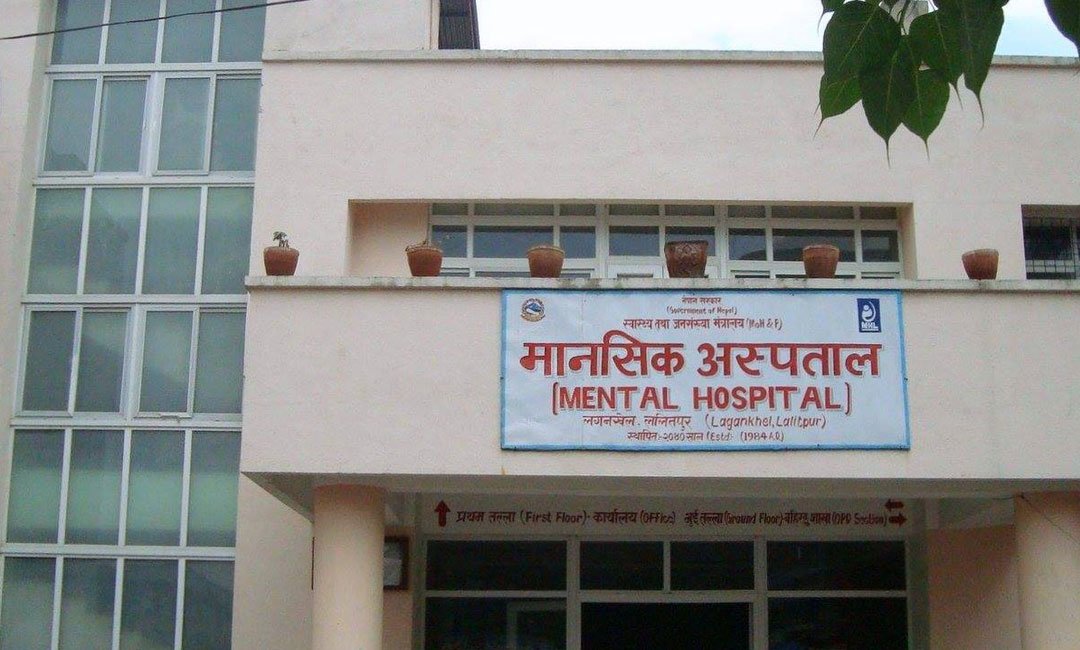Patan Mental Hospital Overwhelmed by Patient Load
With 67 beds and over 200 daily OPD patients, Patan Mental Hospital struggles to serve the 85% of Nepalis lacking mental health treatment access.

Front view of Patan Mental Hospital, Nepal’s only central-level mental health facility, located in Lagankhel, Lalitpur.
Lalitpur: Patan Mental Hospital, located in Lagankhel, is Nepal’s only central-level hospital dedicated to treating mental illnesses. Although it has government approval for 50 beds, it currently operates with 67 beds to accommodate the growing number of patients. Despite this, patients often report not getting beds when they need them.
Dr. Ananta Adhikari, the hospital’s director, states that due to the lack of updated ONM (Organizational and Management) surveys, insufficient human resources, and limited infrastructure, the facility frequently runs out of space.
Government Prioritizing Mental Health But Progress Is Slow
While the government has increasingly placed mental health on its priority list in recent years, implementation has lagged. It has been nearly five years since the National Mental Health Survey was conducted, but the mental healthcare system has yet to improve as needed.
“The need to expand mental health services down to the community level is already evident,” said Dr. Adhikari. “Policy documents clearly mention the promotion of mental health, development of human resources, and the protection of patients’ rights.”
Provincial-Level Mental Health Facilities Could Reduce Patient Load
Dr. Adhikari emphasized that setting up mental health departments and beds in provincial hospitals would help ease the burden on Patan Mental Hospital. He advocates for the creation of inpatient mental health services across all seven provinces to ensure equitable access.
According to him, population growth demands a proportional expansion in mental health services. However, the services currently remain inadequate.
Lack of Infrastructure and Specialist Services Hampers Growth
The hospital operates in an aging, limited-space building that requires urgent renovation and expansion. “We must expand specialized services and upgrade the infrastructure to function effectively as the National Mental Health Center,” said Dr. Adhikari.
85% of Patients Still Lack Access to Mental Health Treatment
Studies reveal that over 85% of people in Nepal with mental health conditions remain untreated. A national mental health survey by the Nepal Health Research Council indicates a 10–12% lifetime prevalence of mental illness, with 4–5% requiring immediate care. Around 2% suffer from severe mental illness, and anxiety affects nearly 25–30%. Substance abuse cases are also on the rise.
Dr. Adhikari links the increase in suicide rates , 20 people a day, directly to untreated mental health conditions.
Shortage of Medical Personnel Adds to the Crisis
Currently, Patan Mental Hospital has only 14–15 staff members, including one clinical psychologist, three senior consultant psychiatrists, six consultant psychiatrists, and five medical officers. The hospital also lacks sufficient nursing staff.
Even though OPD services can be managed with the existing staff, the number of physicians must increase if bed capacity is expanded. The hospital serves around 200 patients daily in its outpatient department, and inpatient wards are always full.
Karnali Leads with Mental Health Strategy
Karnali Province was the first to develop a comprehensive mental health strategy, signaling growing awareness and proactive efforts in the field. NGOs have played a crucial role in supporting these initiatives.
Dr. Adhikari noted that Karnali’s progressive approach reflects a shift in public perception toward mental well-being.
Government Regulation and Coordination with NGOs Essential
Dr. Adhikari insists that government regulation is key to avoiding duplication and ensuring efficient NGO involvement in mental healthcare. “Without clear government direction, some programs will repeat, and many patients may remain untreated,” he warned.
He called for an upgrade of Patan Mental Hospital to national status and expansion of mental health services at provincial levels to meet growing demand effectively.
Source : Swasthyakhabar
Please login to leave a comment.
Login to Comment